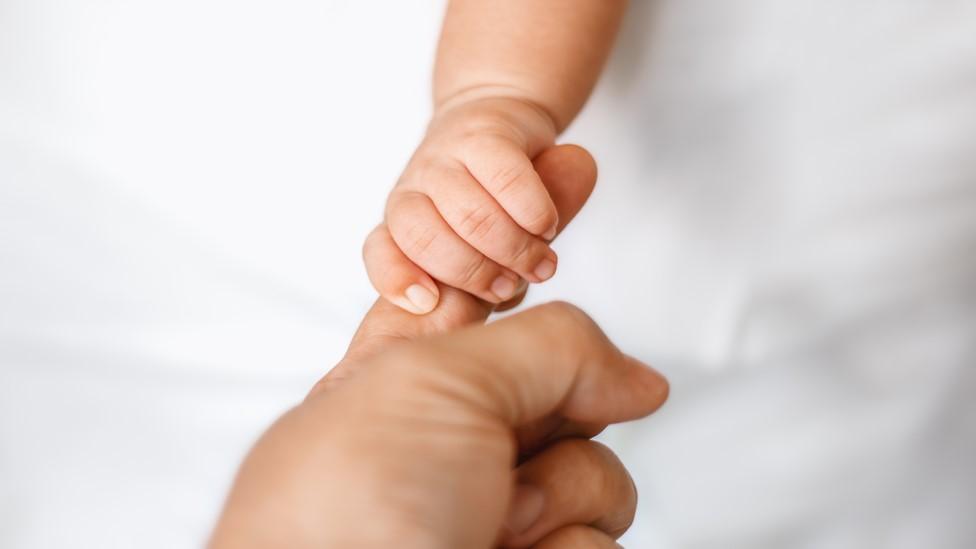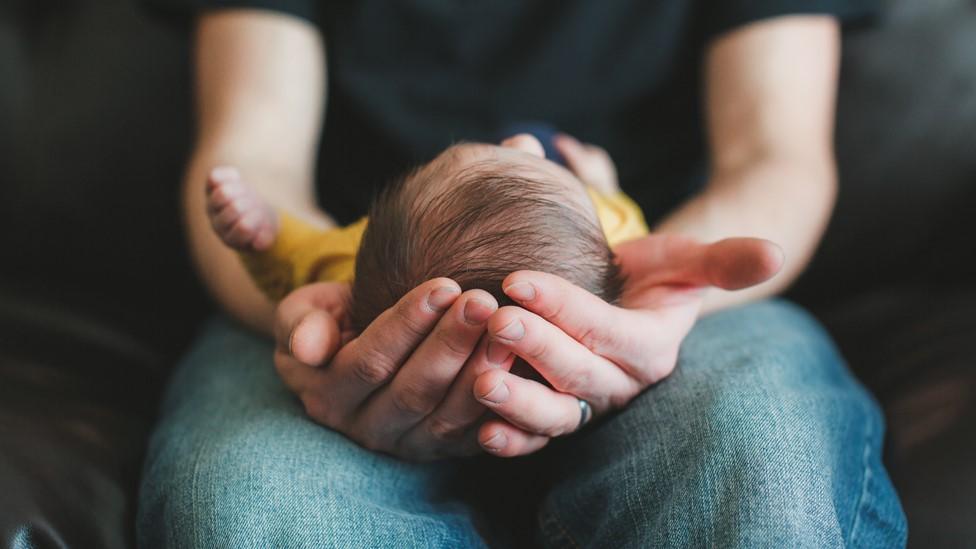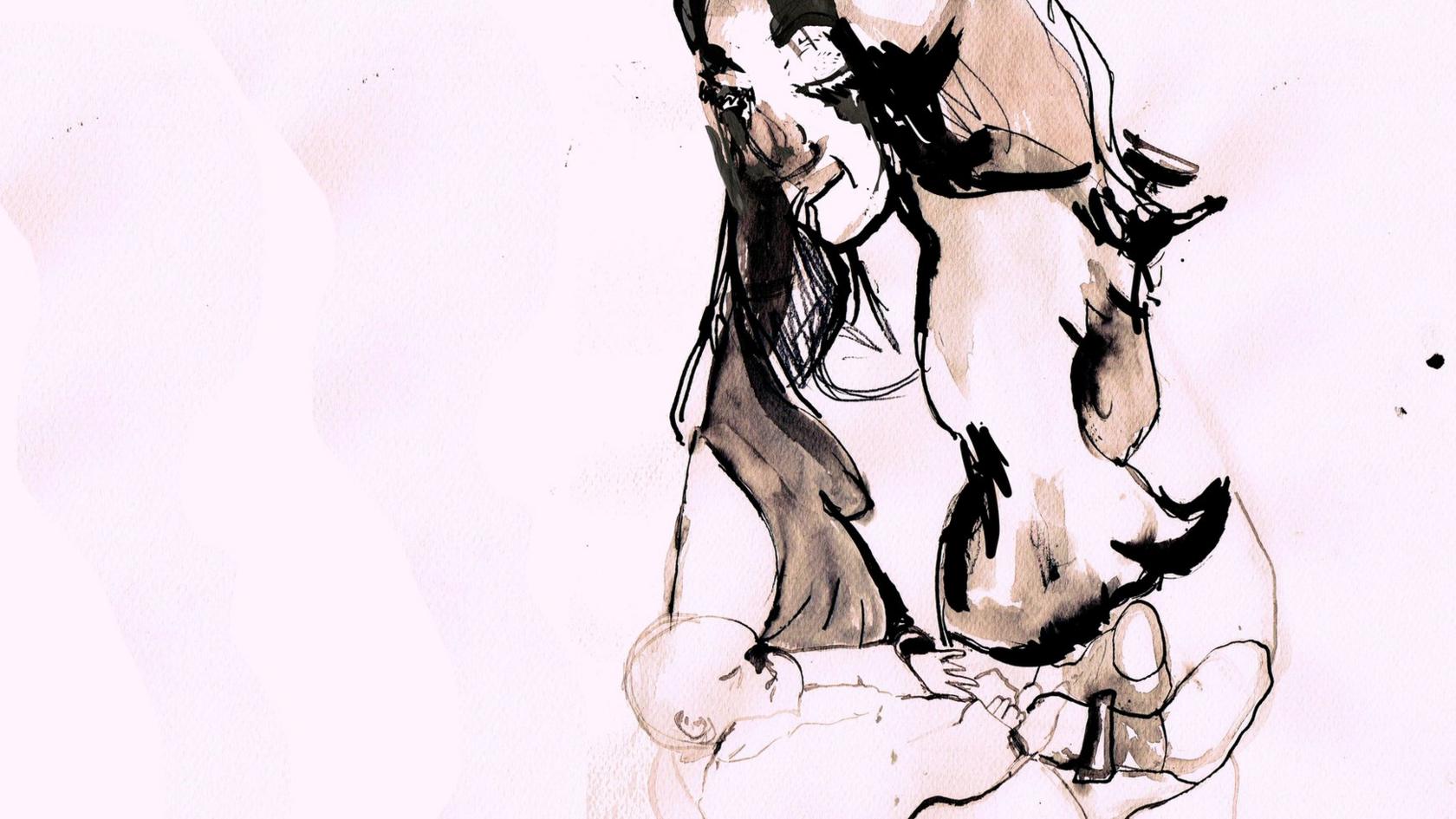'We didn't call ourselves mum and dad for 10 months'
- Published

When babies are taken into care they live with foster carers - sometimes a series of them - until they are adopted. Occasionally they're fostered by people who themselves hope to become the adoptive parents... but know that they may have to hand the baby back.
Nina and Steven hadn't thought it would be difficult to start a family.
"I suppose we were quite blasé," Nina says.
She became pregnant four times in three years, but each time it ended in sadness.
"I ended up having four miscarriages over the course of about three years, which was obviously quite an emotional time for both of us," she says.
Beginning to think about adoption, the couple did some internet research and stumbled across information about "early permanence placements".
This is where people become foster carers to children under two years old but may go on to adopt them later "if the courts decide they cannot be cared for permanently by their birth family," says Hannah Moss of Coram, a group of children's charities which also runs a regional adoption agency.
The first early permanence placement pilots in the UK were run at the end of the 1990s, but the system has since become well-established in England and Northern Ireland.
In an adoption strategy, external published in July the government said it would provide an extra £500,000 for early permanence schemes in England in 2021-22.
It noted that they "offer the child stability, reducing the negative impact of placement changes" and help to forge a stronger bond between carers and children.
In Scotland early permanence placements (often known there as concurrent care) are said to occur infrequently, while in Wales they will begin next year.
With Coram, Nina and Steven began several months of training sessions, written work and personal interviews. Once they had finished, their social worker began to show them profiles of children - including an unborn baby, Leah.
It seemed likely that Leah would be taken into care as soon as she was born, on the grounds that her mother wasn't able to look after her, but it was impossible to know whether the courts would decide in due course that another family member was a suitable guardian.
Nina and Steven decided to go ahead, even though they knew that parting with the baby after months of court proceedings would be heart-wrenching.
But the training helped take the focus off them and put it on to the child, Nina says, "so it was less about us losing a child and more about what is the best thing for the child". They accepted that it would be best for Leah to be cared for by a member of her birth family, if the court gave its approval.
Nina and Steven first went to meet Leah when she was two weeks old.
"Imagine you're on a train and then you're just going to meet this person that somebody's given birth to but you know nothing about," says Nina.
"I would say if I was ever doubtful of what we were doing it was on that train journey, just thinking, 'What have we taken on?' It was quite petrifying really. Although Steven was pretty calm about it, inside I was really panicking."
Leah was in a neonatal ward, and they discovered she would have to stay there for five weeks.
"You're told you start looking after them from day one, which means you have to go and visit them as much as possible so that they get to know you and your smell," Nina says.
As they lived quite far away this meant a lot of travelling backwards and forwards.
Then suddenly they were told to stop going to the hospital, because of a legal technicality. But this hitch was overcome, and ultimately Leah was moved to a hospital closer to their home.

Early permanence
The benefit of early permanence placements is that they minimise disruption to children's lives and give them a chance to bond earlier with people who may adopt them, says Hannah Moss, of Coram.
"Children who are in the care system can experience a number of moves from birth family to care and also within foster care while the courts reach a decision about who will care for them in the long term. Research has shown that this level of disruption has a negative impact on a child's mental health and development," she says.
However, potential carers should be aware that they "need to be able to prioritise a baby's needs", she says, giving the precious gift of stability to some of the most vulnerable in the care system.

It wasn't immediately clear who the birth father was, but within a week of Leah moving in with Nina and Steven, he had been identified by a paternity test, and had put his mother forward to look after her.
"Straight away it's like, 'You're looking after her, but you might not be looking after her.' And we had that to and fro for seven months, which was pretty tough," says Nina.
Going to contact sessions with members of the birth family reinforced for Nina and Steven the idea that they were Leah's foster carers rather than her parents, but friends and family would sometimes refer to them as Leah's mum and dad. Nina would always correct them.
"I think they felt that I was being pedantic, but I thought it was incredibly important, for Leah as well, just to really keep her parents and her birth family in mind," Nina says.
Care proceedings rumbled on in court for seven months.
"Towards the end, before a decision was finally made, every day we would wake up and think about whether we would find out the news that day. The uncertainty was almost intolerable," Nina says.
"But life goes on around you and you have to deal with everything else that comes up. You are also busy looking after a young baby, which is of course tiring and stressful."
Finally, the court reached its decision - Leah would live with her grandmother permanently.
Hannah Moss, of Coram, recognises that early permanence foster carers inevitably develop a strong bond with the child they have cared for, and that parting brings a sense of loss.
In Nina's case, she felt too emotional to go with Steven when he took Leah to visit her grandmother. But they had got to know each other during the contact sessions and she knew that Leah would be well looked after when they finally said goodbye.
"Leah's grandma had written us a lovely card. She'd given us a little present. She told us she would keep her safe. She thanked us for everything," says Nina.
"It was super-special and emotional, and just those words, 'I promise I will keep her safe'... That's actually all we wanted to know."

Nina and Steven went on holiday to escape what Nina describes as the "sad energy" in their house.
But they had already decided that they wanted to go through the early permanence process again.
"There was something really amazing about it," says Nina. "We both felt we would be able to do it again, even if we looked after another child and the same thing happened."
Friends and family, who just wanted the couple to be happy, weren't sure it was a good idea. But Nina and Steven went ahead, and six months later they started caring for another newborn baby girl, Jasmine.
As in Leah's case, they had regular contact meetings with Jasmine's birth mother, who they felt gave them a seal of approval to care for her daughter.
This time there was a 10-month wait, but finally the adoption order went through and - with a huge sense of relief - they became Jasmine's legal parents.

It was only then that they started to refer to themselves as Jasmine's mother and father.
"I still found it really weird to call myself 'mum'," says Nina.
It took time to process the idea that she had made the transition from foster parent to "parent parent", as she puts it.
Jasmine is almost three years old now and is a super-chatty, sweet and cheeky little girl, says Nina.
"She's lovely. She's really confident even though she's shy. She's just very funny, really outgoing, loves reading. She's just special."
Early permanence placements won't be for everybody, says Nina. The important thing is to keep the child at the centre.
"It's a special way to give stability to a child when they really need it and an element of support for the birth family. It's given us so much as well."
Support from their family, friends and the local community was key, she adds.
"There was no judgment of either child, just acceptance. Our neighbours were lovely too. It must have been strange for them as I didn't have a bump or anything, then the next day I'm walking around with a tiny baby, but they've been so accepting."
Nina and Steven have been working closely with Coram to do "life story work", so that Jasmine will grow up understanding all about her childhood.
And they stay in touch with Leah's grandmother. They send a present on Leah's birthday and Leah's grandmother sends them letters and photos, to let them know how Leah is getting on.
Jasmine looks at the photos too, and talks about Leah with Nina and Steven.
"Families are people that love you and look after you aren't they?" says Nina. "And it doesn't really matter if you are blood-related or not."
All names have been changed
You may also be interested in:

When a mother has a child taken from her by the courts and social services the chances are that her next baby will be removed as well - in the baby's own interests. But social workers may give the mother and her partner a chance to show that the new child will be safe in their hands.